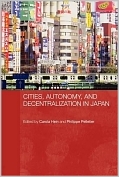| |||||
• polskie
• Zamów informacje o nowościach z wybranego tematu • kontakt |
CITIES AUTONOMY AND DECENTRALIZATION IN JAPANHEIN S. PELLETIER P. EDITORSwydawnictwo: ROUTLEDGE, 2009, wydanie Icena netto: Japan is known as a country in which a potent central power reigns over a compliant hierarchy and, for planning, this has meant strong centralized government control. Nevertheless, examples of autonomy have always existed in the politics, society, and economy of Japan and thrive today in various forms, particularly within urban areas. Following the growth and subsequent collapse of the bubble economy in the early 1990s, and in response to globalization, new trends toward local autonomy and political and economic decentralization are emerging that must be evaluated in the context of Japan's larger political and socioeconomic setting as it becomes increasingly integrated into the global system. Cities, Autonomy, and Decentralization in Japan addresses these new initiatives, providing a cogent compilation of case studies focusing on the past, present, and future of decentralization in Japan. These include small-scale developments in fields such as citizen participation (machizukuri), urban form and architecture, disaster prevention, and conservation of monuments. The book offers the first in-depth analysis of this development outside Japan, approaching the subject from a unique urban studies/planning perspective as opposed to the more common political science method. With contributions from a leading group of international scholars on Japanese urban planning, Cities, Autonomy, and Decentralization in Japan provides a valuable new addition to the current English-language literature. Table of Contents 1 Introduction : decentralization and the tension between global and local urban Japan 2 Local initiatives and the decentralization of planning power in Japan 25 3 Concentration and deconcentration in the context of the Tokyo Capital Region Plan and recent cross-border networking concepts 55 4 Financial stress in the Japanese local public sector in the 1990s : situation, structural reasons, solutions 81 5 Centralization, urban planning governance, and citizen participation in Japan 101 6 Machizukuri in Japan : a historical perspective on participatory community-building initiatives 128 7 Whose Kyoto? : competing models of local autonomy and the townscape in the old imperial capital 139 8 Conclusion : decentralization policies - questioning the Japanese model 164 216 pages, Paperback
Po otrzymaniu zamówienia poinformujemy pocztą e-mail lub telefonicznie, |


